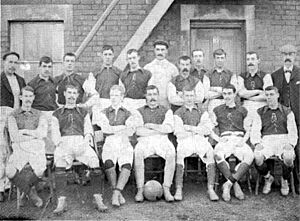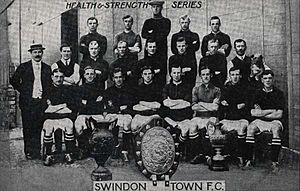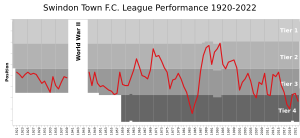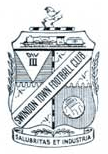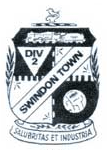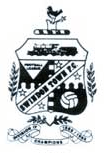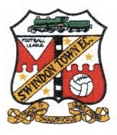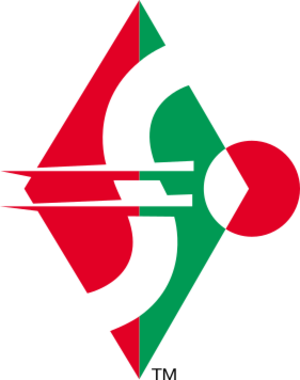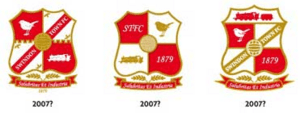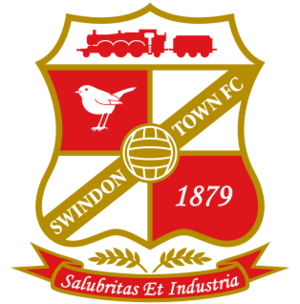History of Swindon Town F.C. facts for kids
The history of Swindon Town F.C. tells the story of a football club that started way back in 1881. Over the years, they've won different competitions and even played in the top league in England, the FA Premier League.
Contents
How Swindon Town Started
Swindon Town Football Club was founded by a man named Reverend William Pitt. This happened sometime between 1879 and 1881. The club officially uses 1881 as its founding year.
There was some confusion about the exact start date. Some old newspaper reports from 1879 showed a game involving a team called Swindon Association Football Club, with William Pitt playing. Reverend Pitt was a church leader in Swindon. He left the club in 1881 when he moved to a new church. In 1883, the club changed its name to Swindon Town Football Club.
Early Years (1881–1945)
Swindon Town was an amateur club until 1894. This means the players didn't get paid. They played friendly matches against local teams and first joined the FA Cup in 1886. They also won the Wiltshire Cup six times in a row from 1886 to 1892.
In 1894, Swindon Town became a professional club, and the players started getting paid. They joined the Southern League. They played their games at the County Ground starting in 1896. They also joined the Western League in 1897 to play more competitive matches. In 1899, they became Western League champions.
The team struggled for a few years, but things changed in 1907 when they signed two important players: Jock Walker and Harold Fleming. On 5 September 1908, they had their biggest win, beating Norwich City 10 goals to 2! Fleming became a club legend, scoring 202 goals in 332 games for Swindon. He even played for England eleven times.
In the 1909–1910 season, Swindon reached the FA Cup semi-finals. They also won the Dubonnet Cup in Paris, beating Barnsley 2–1. This trophy was very big and heavy!
The next season, 1910–1911, Swindon won the Southern League championship. This led to a special game called the Charity Shield against Football League champions Manchester United. It was a high-scoring game, with Manchester United winning 8–4. The money from ticket sales for this match was later given to the survivors of the RMS Titanic sinking.
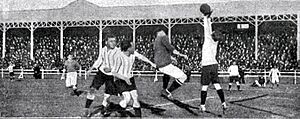
Swindon became Southern League champions for the second time in 1914. Football leagues were then stopped because of World War I. The club continued to play friendly games during the war.
Leagues started again in 1919. In 1920, Swindon joined the Football League as a founding member of Division Three. They won their first game 9–1 against Luton Town, which is still a club record in League matches. However, it would be over 40 years before they were promoted.
In 1926, Harry Morris, Swindon's top goalscorer ever, joined the club. He scored an amazing 229 goals in 279 games over seven seasons.
War Years (1939–1945)
The Football League was stopped again in 1939 due to World War II. The County Ground was even used as a Prisoner-of-war camp during this time. Three Swindon Town players, Alan Fowler, Willie Imrie, and Dennis Olney, sadly died in the war. There is a memorial for them at the stadium.
Era of Success (1945–1979)
After the war, Swindon played in the lower divisions. In 1963, they were promoted to the Second Division. Two years later, they were relegated again. But with good managers like Bert Head and Danny Williams, things improved.
On 15 March 1969, Swindon beat Arsenal 3–1 to win the League Cup! This was a huge achievement and the only time they've won this cup.
That same year, they were promoted back to the Second Division. The star player, Don Rogers, also helped Swindon win the 1970 Anglo-Italian Cup and the Anglo-Italian League Cup.
Ups and Downs (1980–1991)
Swindon reached a low point in 1982 when they were relegated to the Fourth Division. But they bounced back, becoming Fourth Division champions in 1986 with a record 102 points! A year later, they won the play-offs to get promoted again.
In 1990, Swindon Town won the Division 2 play-off final against Sunderland, meaning they were promoted to the First Division for the first time! However, this joy was short-lived. The Football League decided to move them down two divisions because of some rule breaches. After an appeal, this was reduced to just one division. So, Swindon missed out on playing in the top league.
In March 1991, former Tottenham midfielder Glenn Hoddle became Swindon's new player-manager. He helped the team avoid relegation.
The "Yoyo" Years (1991–1999)
Under Glenn Hoddle, Swindon continued to improve. A year later, they beat Leicester City 4–3 in the play-off final, finally getting promoted to the Premiership! This was the first time the club reached the very top division of English football.
Hoddle left for Chelsea in 1993, and Swindon struggled in the Premiership. They were relegated with a record of only five wins and 100 goals conceded. They were relegated again the next season, dropping to Division Two.
However, they quickly bounced back, winning the Division Two championship in 1996 and returning to Division One. The club faced financial difficulties during this time. In January 2000, Swindon had serious money problems and went into administration. This meant the club was managed by administrators to try and sort out its finances. A new group of owners took over, saving the club, but it was too late to avoid relegation to Division Two.
New Challenges (2000–2007)
Swindon continued to have a tough time. Managers came and went, and the club faced more financial issues. In 2002, a long-time supporter, Sir Seton Wills, said he could no longer keep helping the club financially.
On the pitch, striker Sam Parkin scored 26 goals in 2002-03, helping Swindon finish tenth. In 2003–04, with Tommy Mooney joining, they reached the Division Two play-offs but lost in the semi-finals.
The club also tried to build a new stadium, but the plans were rejected due to environmental concerns. More financial problems arose, including unpaid tax bills. The club urged fans to come to games to help with income.
In 2006, Swindon was relegated to League Two, the lowest division in the Football League. This made them the first former Premiership team to drop to this level.
Dennis Wise became the new manager in May 2006. Swindon started the League Two season very well, winning their first six games. However, Wise and his assistant left for Leeds United in October. Paul Sturrock then took over as manager.
Stadium and Club Ownership
The club continued to explore plans for redeveloping the County Ground. There were also discussions about new investors and changes in club ownership. These were complicated times for the club's management and finances.
Sponsorship and New Logo
Nationwide, a long-time sponsor, ended their deal in 2007 due to the club's financial issues. Kingswood Construction then became the new sponsor.
In 2007, the club changed its badge. Fans voted for a new design that brought back elements of the club's heritage, like a Robin, a train (representing Swindon's railway history), and a football. It also included the town's motto, 'Salubritas et Industria'.
League One Years (2007–2011)
A new group took over Swindon Town in 2007. Managers changed again, with Paul Sturrock leaving and Maurice Malpas taking over. Swindon managed to stay in League One.
Danny Wilson became manager in December 2008. In the 2009–10 season, Swindon had a great year, reaching the League One play-off final at Wembley. However, they lost 1–0 to Millwall, missing out on promotion to the Championship.
The next season, 2010–11, was tough. Swindon went on a long winless run and were relegated back to League Two.
Recent History (2011–Present)
After the season, former player Paulo Di Canio became the new manager. After a shaky start, Swindon went on an amazing 15-match unbeaten run. They won 10 league games in a row, a new club record! They also did well in the FA Cup, beating Premiership side Wigan Athletic. On 28 April 2012, Swindon won the League Two championship, securing promotion back to League One.
In February 2013, Di Canio resigned. Kevin MacDonald took over and guided Swindon to the League One play-offs, but they lost in a penalty shootout.
In the 2014–15 season, Swindon reached the League One Play-off final again after an incredible 5–5 draw (winning 7–6 on aggregate) in the semi-finals. But they lost 4–0 in the final at Wembley.
In the 2016–17 season, Swindon were relegated to League Two for the third time.
On 9 June 2020, Swindon were crowned League Two champions based on points per game, as the season was stopped early due to the COVID-19 pandemic in the United Kingdom. However, the next season brought more financial difficulties. The club was relegated again in April 2021.
There were more changes in ownership and management in 2021. Players and staff faced issues with unpaid wages, and the club was given a transfer embargo. Eventually, Australian businessman Clem Morfuni took over the club.
Ben Garner became the new head coach. He led Swindon to a 6th place finish in the 2021–22 season, but they lost in the play-off semi-finals. Since then, the club has seen several more managerial changes, including Scott Lindsey, Jody Morris, and Michael Flynn.
 | Frances Mary Albrier |
 | Whitney Young |
 | Muhammad Ali |


